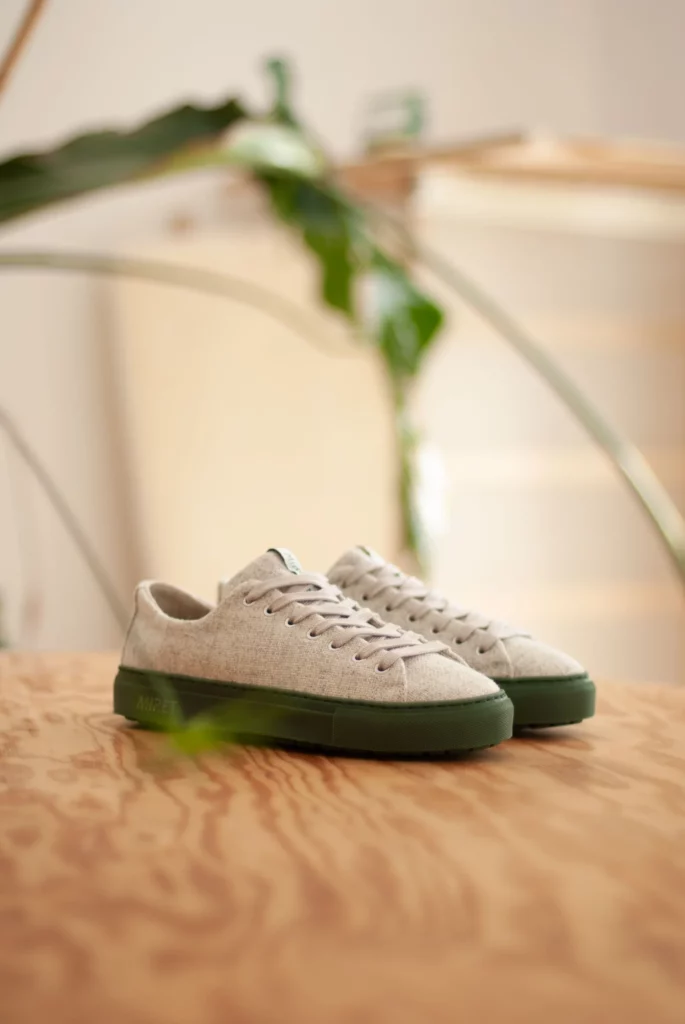Shoes and the materials that are being used in footwear manufacturing have a detrimental effect to the environment. The numbers showing the negative environmental impact of footwear are staggering. Most of the footwear manufacturing materials are made from oil derivatives like polyester, synthetic rubber, polyurethane foams and textiles, synthetic reinforcements, etc. which are sources of micro-plastics that pollute our grounds, seas, air, and water, and ultimately end up on our plates. The second most widely used material is leather, filled with toxic chemicals. The most common of these is a heavy metal called chromium which is the 4th most toxic pollutant in the world.
Due to the manufacturing process creating huge amounts of waste, Miret felt obligated to solve this issue. Miret is a family business run by two brothers inherited from their father. Croatian family business is responsible for crafting high-end ecological footwear. It took them 6 years to create Miret ecological sneakers. In those 6 years, they encountered many challenges and obstacles.
Their story
Miret didn’t want to develop a shoe made out of recycled PET bottles and plastic waste because they concluded that they didn’t want to put plastic materials back in circulation. They rather focused on natural materials. Their vision was to set up a manufacturing process that minimizes the usage of synthetic materials in every step of the manufacturing process – from raw material production to the final assembly and delivery of the product to the customer. But the production of products made out of natural materials had its challenges and the greatest challenge was the price. Synthetic materials are very cheap to manufacture and easy to shape into a final product while manufacturing natural materials requires plants to be grown in order to obtain fibers, the fibers need to be processed and shaped into the final product.
Sustainability behind all
The first challenge was that these steps were much more expensive and difficult. The second biggest challenge was to create a product which is durable enough to substitute a leather or synthetic alternative. All of these issues were huge challenges in the process of the development of a more sustainable alternative to leather and synthetic footwear. After all the researchers they have focused their efforts into finding manufacturing partners which had ecology and sustainability as their core values. The search for their suppliers was long and difficult but in the end, they were able to develop and substitute almost all non-sustainable materials with their natural, sustainable, durable renewable alternatives. One of the main plants which they use to obtain fibres from is hemp which is grown on European farms and fully processed in Europe while maintaining every stage of the manufacturing process as healthy as possible to the individual and to the environment. Hemp is completely processed without any chemicals, naturally durable, antibacterial, breathable, and with a low environmental impact. In total, they are using 10 different plants and wool to craft their materials and sneakers. Sneakers are almost entirely made out of natural materials. The remaining materials are no sustainable materials such as glue and stitching thread which are actually making their sneakers more sustainable as they are greatly improving the durability of the sneaker. By doing this they are greatly reducing the product’s lifetime CO2 emissions.
After the product development was finished they chose Kickstarter as their first selling channel. This enabled them to lower the selling price and to kick-start an otherwise highly capital intensive industry. The greatest challenge in the promotion of their sneakers was to raise awareness of the huge negative impact of footwear on the environment. Another great challenge was the intensified greenwashing efforts by many brands in the world. Last but not least, they had to choose a distribution and marketing channel – online sales and pre-sale via crowdfunding.
Miret aims to eliminate toxic substances and plastic components by making 97% natural, bio-based sneakers made from wool and plants without compromising on design, durability, or comfort. The remaining 3% are synthetic thread and glue that ensures their sneakers are made to last. Today on a daily basis they are working hard to achieve their goal of replacing that 3% with natural materials that will provide just as much durability.
STANDARD 100 by OEKO-TEX
Mirets are the only sneakers in the world to hold the STANDARD 100 by OEKO-TEX label for the entire product and not just specific components. This label means that their sneakers contain zero toxic substances harmful to human health. Their manufacturing process minimizes the usage of synthetic materials in every stage – from raw material production to the final assembly and delivery of the product to the customer. Since the fashion world is slowly turning to sustainable fashion, there is no doubt that this is a brand that will be one of the leaders in its industry.
Images used in this article are the ownership of the Miret company.



